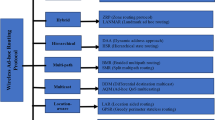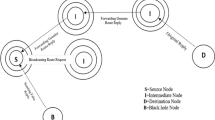Abstract
The blockage is a crucial problem in mobile ad hoc network intruding the complete improvements of the network. The load balancing of the network with blockage is an additional vast difficulty over the mobile ad hoc networks and the reason for performing routing is based on the differences in the costs made for links. Several prevailing routing protocols provide a solution of loads or altering the blockages in terms of scalability. The intention is to design a traffic adjustable routing LETARP protocols. The shifting of the load from blockage nodes to slightly crucial nodes along with sharing of other nodes with the capabilities of influence within the route can improve the complete lifespan of the network. The proposed bi-directional standard for congestion density and link costs based on routing is used for varying the blockage situations. The routes linked with small congestion intensity and the normalization used for selecting the enhanced service life for the packet based transmissions. The performance of the networks based on the designed LETARP is evaluated based on the blockage adjustable routing protocols for the proportion of packet delivery, end-to-end delivery and routing.







Similar content being viewed by others
References
Kush, A., Kumar, R., & Gupta, P. (2004). Power aware virtual node routing protocol for ad hoc networks. Ubiquitous Computing and Communication Journal,2(4), 48–57.
Pattanayak, B. K., Mishra, M. K., Jagdev, A. K., & Nayak, A. K. (2011). Power-aware ad hoc on-demand distance vector (PAAODV) routing for MANETs. Journal of Convergence Information Technology,6, 6.
Chokhawala, J., Mo, A., & Cheng, K. (2004). Optimizing power-aware routing in mobile ad hoc networks. Department of Computer Science, The University of Houston, University Park, Houston, USA.
Chlamtac, I., Conti, M., & Liu, J. J. N. (2003). Mobile ad hoc networking: Imperatives and challenges. Ad Hoc Networks,1, 13–64. https://doi.org/10.1016/s1570-8705(03)00013-1.
Rao, J. D. P., Dey, A. K., & Singh, T. D. (2013). Energy saving issue in mobile adhoc networks. In Conference—AICON on global innovations in CSE and IT (pp. 263–271), AICON, Durg, India. ISBN: 978-81-923288-1-2.
Arulanandam, K., & Parthasarathy, B. (2009). A new energy level efficiency issues in MANET. International Journal of Reviews in Computing,1, 104–109.
Chen, K. G., & David, K. A survey of context-aware mobile computing research. Technical Report. Department of Computer Science, Dartmouth: Microsoft Research, and by Cisco Systems. F30602-98-2-0107, F49620-97-1-03821.
Kumar, P. R., & Kawadia, V. (2003). Power control and clustering in ad hoc networks. In IEEE INFOCOM. Department of Electrical and Computer Engineering, and Coordinated Science Laboratory, The University of Illinois at Urbana-Champaign, West Main St. Urbana.
Liang, W. (2002). Constructing minimum-energy broadcast trees in wireless ad hoc networks. In Conference—MOBIHOC‟02 (pp. 112–122), ACM, Switzerland.
Maleki, M., Dantu, K., & Pedram, M. (2002). Power-aware source routing protocol for mobile ad hoc networks. In ISLPED ‘02, ACM, California, August 12–14, 2002.
Sri Hari, N., Chalama Reddy, O., & Satyanarayana, N. (2011). Power optimization in mobile ad-hoc networks. In Conference—Proceedings of the 5th national conference; INDIACom-2011, New Delhi, India. ISSN 0973-7529, ISBN 978- 93-80544-00-7.
Tantubay, N., Gautam, D. R., & Dhariwal, M. K. (2011). A review of power conservation in wireless mobile adhoc network (MANET). International Journal of Computer Science,8(4), 378–383.
Wattenhofer, R., Li, L., Bahl, P., & Wang, Y.-M. (2001). Distributed topology control for power efficient operation in multihop wireless ad hoc networks. In Proceedings IEEE INFOCOM 2001. Conference on computer communications. Twentieth annual joint conference of the IEEE computer and communications society (Cat. No. 01Ch37213) (Vol. 3, pp. 1388–1397). IEEE.
Singh, S., Woo, M., & Raghavendra, C. S. (1998). Power-aware routing in MANETs. In MobiCom ‘98, Proceedings of the 4th annual ACM/IEEE International Conference on Mobile computing and networking (pp. 181–190). https://doi.org/10.1145/288235.288286.
Narayanaswamy, S., Kawadia, V., Sreenivas R. S., & Kumar, P. R. (2002). Power control in ad-hoc networks: Theory, architecture, algorithm and implementation of the COMPOW protocol. In European wireless conference (Vol. 2002, p. 156162).
Preet Singh, T., Kaur, M., & Sharma, V. (2001). Automated recovery based power awareness (ARPA) algorithm for MANETs. In International conference on circuits, system and simulation (Vol. 7, pp. 154–158). Singapore: IACSIT Press.
Toh, C.-K. (2001). Maximum battery life routing to support ubiquitous mobile computing in wireless ad hoc networks. IEEE Communications Magazine,39, 138–147.
Rishiwal, V., Verma, S., & Bajpai, S. K. (2009). QoS based power-aware routing in MANETs. International Journal of Computer Theory and Engineering,1, 47–54.
Anthony, E. (2002). Energy concerns in wireless networks. IEEE Wireless Communications,9, 48–59.
Prakash, S., Saini, J. P., & Gupta, S. C. (2010). A review of energy efficient routing protocols for mobile ad hoc wireless networks. International Journal of Computer Information Systems,1(4), 36–73.
Author information
Authors and Affiliations
Corresponding author
Additional information
Publisher's Note
Springer Nature remains neutral with regard to jurisdictional claims in published maps and institutional affiliations.
Rights and permissions
About this article
Cite this article
Ezhil Selvan, T.C., Malathi, P. & Ezhilin Freeda, S. An Efficient Method for Adjustable Load Equalization for Reducing Traffic in Routing for Mobile Ad Hoc Networks. Wireless Pers Commun 110, 2149–2164 (2020). https://doi.org/10.1007/s11277-019-06834-9
Published:
Issue Date:
DOI: https://doi.org/10.1007/s11277-019-06834-9




